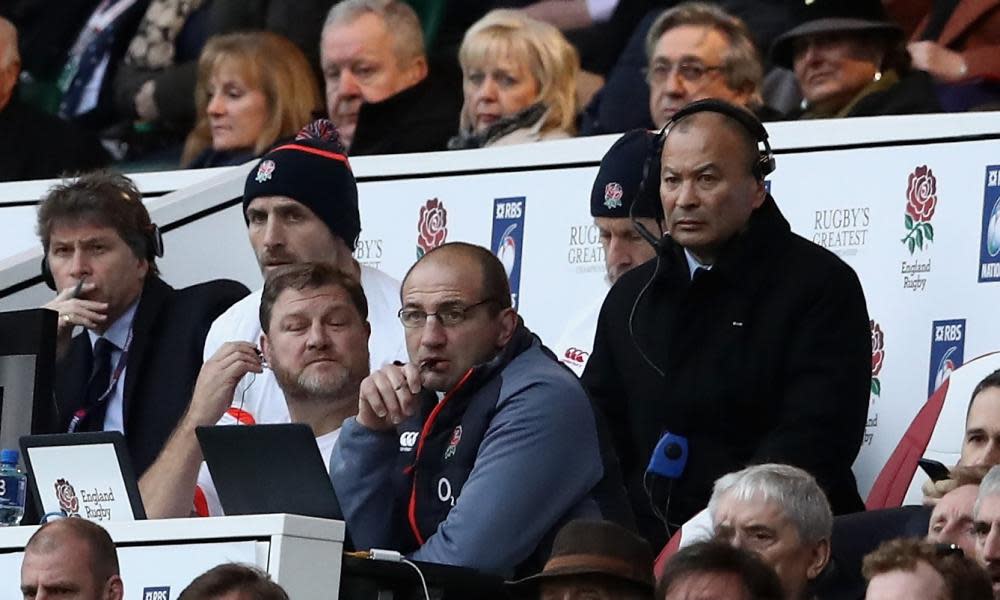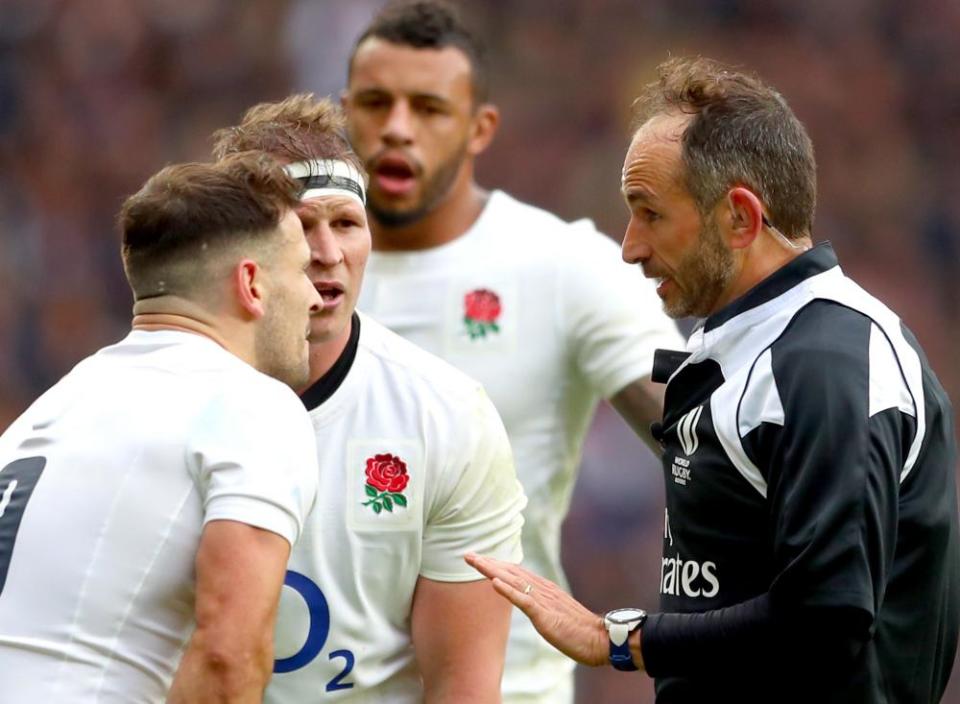England’s players must develop quick wits however odd Jones’s complaints | Robert Kitson

When Eddie Jones decided to relocate squad training to Oxford this week he was unaware how appropriate his choice would turn out to be. The old university city is full of brilliant thinkers and, boy, could England do with a mind-expanding seminar or two. Rugby will forever demand physicality but if Jones’s team wish to win another Six Nations grand slam they will need to exhibit more brainpower than they did against Italy.
It was not simply the prolonged failure to find a way around the Azzurri’s cute diversionary ruck tactics – odd as that appeared in an era when coaches can get messages on to the field almost instantly. More glaring still was the lack of mental flexibility, the bafflement and the sheer confusion when the anticipated masterplan – a 60-point romp in this instance – unravelled. At times it was like watching 15 Daleks stuck at the bottom of an unexpected staircase.
Jones’s protestations after England’s eventual 36-15 win were also a rare example of the former Wallaby coach barking up the wrong eucalyptus tree. For such an experienced figure from a powerful leading nation that has now won 17 Tests in a row to decry Italy’s right, as massive underdogs, to rewrite the rules of engagement was strange for a man who loves his cricket so. Only last year Jones was gleefully referencing Bodyline, the English tactic invented to counter Australian cricket supremacy in the 1930s. This was effectively Italian rugby’s version – albeit, in this case, anti-Bodyline – and the visitors’ cunning plan worked a treat until the last 10 minutes when their fitness faded.
To suggest Brendan Venter’s brainwave was somehow illegal or unethical is ridiculous. For a start other teams have employed it before; in the autumn the England defence coach, Paul Gustard, even publicly referenced the tactic after Australia’s David Pocock used it against Ireland in Dublin. Where in the book of sporting etiquette does it say that Andy Murray’s opponents must only play a certain style of tennis or that visiting teams to Twickenham must line up to take their ritual punishment like small boys at a 1950s boarding school?
What is top-class sport, furthermore, if not a clever battle of wits, every bit as much as a trial of strength? One of rugby union’s greatest pluses is its multidimensional nature, its giant Rubik’s Cube of possibilities. None of us would ever decry the nerve and resilience required to play international rugby but what sets it apart from many other sports is the intellectual challenge that jostles with the basic instincts. It is why the All Blacks are so good: not only do they play hard and fast, their best men and women understand the game innately better from an early age.
Which, one suspects, was precisely why Jones did his best to divert attention away from the poverty of his side’s decision-making at Twickenham. Calling the game “a joke” and inviting supporters “to ask for your money back” told only half the story. Privately he will know his senior players – and assistant coaches – should have been quicker to switch to more direct pick-and-go tactics, which would have forced Italy to change their own unorthodox tune. He will also have been professionally peeved that Conor O’Shea stole a march on him.
The faintly wolfish grins of Vern Cotter and Joe Schmidt, the two ultra‑canny Kiwis in charge of England’s remaining two opponents Scotland and Ireland, will also have been in the back of his restless mind. The Scots have already come up with smart innovations of their own in this championship, successfully sticking several backs into the lineout to confuse the Irish in round one, while it is hard to imagine Schmidt’s Ireland taking as long to deal with the Italian conundrum as Jones’s boys did.
All of this is grand news for the Six Nations Championship, already one of the most intriguing for a long time, if less so for England’s title prospects. They will still be favourites to defeat the Scots, not least because their opponents have not won at Twickenham since Rab C Nesbitt was a bairn. In beating Wales 29-13, however, Scotland again underlined their status as an improving side – now up to a record high of fifth position in the world rankings – who are relishing their rugby and will no longer view a trip to London with doom and gloom.
In Stuart Hogg, Finn Russell and Tommy Seymour, in particular, they have quick-thinking players who, on current form, should be bang in the British & Irish Lions frame for this summer’s tour of New Zealand. If they win enough quick ball and their set piece stands firm, the Scots can be relied upon to pose England some more uncomfortable questions.
Whether that will be enough to stop a team now just 80 minutes away from equalling New Zealand’s world record for a tier‑one nation of 18 successive Test wins is another matter. Jones is no fool and still has time beneath Oxford’s dreaming spires to work out a way of ensuring England graduate with honours this season, even if four tries against Scotland prove elusive. He will be conscious, nevertheless, that his team cannot be compared seriously to the greatest All Black sides until they think more clearly in the first 40 minutes of games, not just the last 20.
Best Actor
The Academy Awards have come and gone but rugby’s play-actors are still giving Oscar-worthy performances. No match, either internationally or at club level, is currently complete without at least one player toppling to the deck like a felled pine following the slightest nudge or else complaining loudly to the referee about an opponents’ alleged misdemeanour. It makes life harder than ever for top-level referees, which made Romain Poite’s wonderful putdown – “I am a referee, not a coach” – during the England game particularly timely.
While it would clearly help if one or two officials learned a few words of French or Italian prior to games involving those nations, players cannot complain about the consistency of refereeing decisions when they are actively trying to twist those same decisions at every turn.

And Another Thing …
Prepare for the mother of all rows across the Channel after Bernard Laporte, the president of the French Rugby Federation, signalled his intention to push ahead with plans to centrally contract the country’s top 40 players.
Laporte is keen to copy the system in Ireland, the big difference being the Irish union do not have a Top 14 full of millionaire owners to contend with. He also believes it will help the French national side “to have the atmosphere of a club team that you can sense when playing against Ireland.” As has long been the case in England, actually making it happen will take a miracle.

 Yahoo News
Yahoo News 
